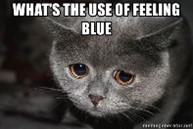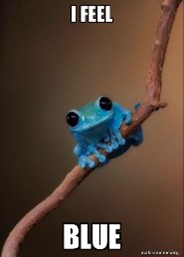Are you looking for a way to tell someone that you feel down? You could tell them that you’re “feeling blue” and need them to cheer you up. This post unpacks the meaning and origin of this expression.
Meaning
If you’re “feeling blue,” you’re having a bad day. You might feel slightly depressed or like the world is against you for the next day or two. Everyone feels blue from time to time; it’s just part of life. However, it could also signify that you’re starting to fall into a deeper depression.
However, feeling blue doesn’t describe a prolonged state of depression. It’s a temporary emotional state where the person will eventually return to normal thinking. Typically, they can clear the depressive thoughts without the need for prescription medications. If you need meds, you have a problem with depression relating to the direction of your life.
You could be feeling blue for several reasons. You might miss someone, like your partner or dog, and you wish they were around. You could also feel sadness or desperation relating to your position in life. Or it could be due to the anniversary of someone close to your passing away. Feeling blue means that you’re depressed, but you’re not going to let it permanently affect your mental health.
Example Usage
“Honey, I’m feeling blue today. I don’t know if it’s the pregnancy and the changes in my hormones or what, but I feel terrible.”
“Everyone ends up feeling blue from time to time. The key is to avoid leaning into it. You gotta bounce back from it right away.”
“Recognize you’re feeling blue and make a proactive decision not to let it turn into depression. We all have the power of controlling our mind at our disposal.”
“Feeling blue isn’t like feeling depressed. When you’re depressed, you never see the light at the end of the tunnel. When you’re feeling blue, the sky’s eventually clear.”
“Okay, I’ll admit I’m feeling blue today. I’m sorry if I made everyone feel uncomfortable; I didn’t mean it.”
“We’re all one day away from feeling blue. You never know when you’ll wake up and have a bad day.”
“The best thing you can do when you’re feeling blue is to look yourself in the mirror and tell yourself that you love yourself.”


Origin
The expression “feeling blue” originates from the 1700s. It appears in print in “A Classical Dictionary of the Vulgar Tongue," published in 1785. At the time, the saying had the definition of “being confounded, disappointed, or terrified.”
Early usage of the saying suggests it has links to pallor and illness. A corpse is lifeless and pale and has a slightly blue hue to it. If someone receives a beating and gets bruised, we say they appear “black and blue” to describe the discoloration.”
Phrases Similar to Feeling Blue
- Under the weather.
- Feeling depro.
Phrases Opposite to Feeling Blue
- Feeling great.
What is the Correct Saying?
- Feeling blue.
Ways People May Say Feeling Blue Incorrectly
The phrase doesn’t refer to a physical change into a blue state. It doesn’t mean that you’re turning blue due to lack of oxygen, like when you’re choking. It means that you feel depressed and you need cheering up. It’s a temporary mental state and perfectly normal to endure from time to time.
Acceptable Ways to Phrase Feeling Blue
You can use the phrase “feeling blue” to describe when you’re feeling down or depressed. The saying doesn’t refer to deep depression; it’s more like another way of saying the “Monday blues,” but they can affect you on any day of the week. It’s suitable for professional and social use.
You could say a colleague is feeling blue at work after the manager gave them a warning for being late twice in the same week. You could tell your partner you’re feeling blue and you need them to cheer you up at home.